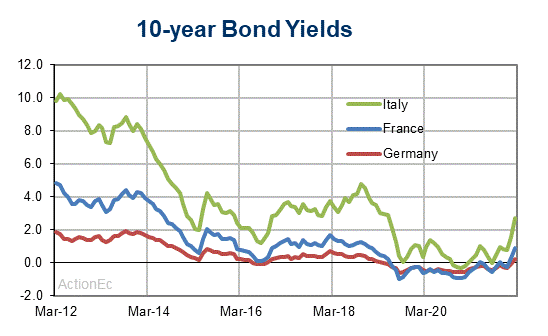Growth is slowing fast, and inflation remains far above target in both the Eurozone and the UK. Second round effects are now dominating the inflation trajectory. With demand across the services sector also slowing, the room for companies to pass on higher costs is diminishing. Policy settings are already restrictive, and the room for additional tightening is diminishing.
The ECB’s September decision remains wide open.
Growth may be slowing faster than anticipated, but in the current situation that doesn’t necessarily mean that price pressures will ease equally fast it seems. There have been outright calls for additional hikes from the hawks, and while others have sat on the fence, the bias seems to be still slightly in favor of another 25 bp raise in interest rates later this month.
Plenty of ECB members were on stage this week with differing views on the timing and necessity of rate hikes, with some advocating for caution and others for further increases:
- Kazimir: flagged that a September rate hike may be preferable to a later increase, emphasizing it’s too early to declare victory over inflation. The hawks have been more vocal than the dovish camp ahead of the blackout period, and another hike next week seems the most likely option.
- Villeroy: Upcoming ECB meetings remain open; interest rates are close to their peak, and maintaining higher borrowing rates is more important than significantly raising them.
- Knot: Warned markets may underestimate rate hike chances, emphasizing the importance of achieving the ECB’s 2% inflation target by 2025. Knot suggested the decision on whether another rate hike is needed is a close call, as a slowdown in economic activity is sure to dampen demand, while updated inflation projections won’t differ much from the last round in June.
- Visco: Urged caution regarding future monetary policy, suggesting a potential pause in the tightening cycle or careful consideration of further moves.
- Lane: Anticipates core inflation slowing in the coming months and sees positive signals, but his comments could support either a pause or a small rate hike. Lane stressed that inflation is still very high as second round effects play out, but seemed cautiously optimistic that we are on an improving trend, along with firms’ price setting behaviour and attempts to boost profit margins.
- Wunsch: Hinted at another rate hike due to persistent inflation but suggests a pause is also possible. Wunsch stressed that inflation remains “very persistent” and that it is too soon about a real stop. Another comment that leaves the door pretty much open to another hike, but also to a pause at the next council meeting.
- Centeno: Warned against over-tightening monetary policy, suggesting a discussion about a pause due to lower-than-expected growth.
Meanwhile, a recent Bloomberg survey sees one more rate hike, although respondents are evenly split between a hike in September or a hawkish pause next week and a hike in October. The survey suggests the ECB will start cutting rates in March next year, which suggests that respondents are more pessimistic on the economic outlook than ECB officials, who have been eager to prevent markets pencilling in early cuts and are sticking with a “higher for longer” message. We see a slightly higher chance of a hike next week, as the hawks have been more verbal than the dovish camp over the past couple of weeks.
Data releases this week showed that high inflation and rising interest rates have weighed on confidence and kept a lid on consumption. European stock markets were down and on course for an 8th day of correction. The Stoxx 600 is at its longest turn lower since 2016, as confidence in the economy erodes.

German inflation, German production numbers, a downward revision to Eurozone GDP and weaker than expected PMI reports kept a lid on the Euro and EURUSD dipped to 1.0685. German August HICP inflation was confirmed at 6.4% y/y, in line with the preliminary release and down from 6.5% y/y in August. The deceleration in the headline rate was less pronounced than initially expected.
That effect will also be felt at the Eurozone level and should help to strengthen signs that inflation has peaked, although the most recent uptick in global oil prices will keep energy price inflation underpinned, while weather events as well as the impact of Russia’s war on Ukraine are keeping food prices high. However, the ECB’s decision has not been made easier, while overall sentiment remains very depressed.
EURUSD has remained under pressure and dropped more than -1% over the past week, as markets scale back tightening expectations. The Fed may also be nearing peak rates, but the US growth outlook is better by comparison and risk aversion is favoring the dollar at the moment, especially as China’s recovery still looks shaky.
Click here to access our Economic Calendar
Andria Pichidi
Market Analyst
Disclaimer: This material is provided as a general marketing communication for information purposes only and does not constitute an independent investment research. Nothing in this communication contains, or should be considered as containing, an investment advice or an investment recommendation or a solicitation for the purpose of buying or selling of any financial instrument. All information provided is gathered from reputable sources and any information containing an indication of past performance is not a guarantee or reliable indicator of future performance. Users acknowledge that any investment in Leveraged Products is characterized by a certain degree of uncertainty and that any investment of this nature involves a high level of risk for which the users are solely responsible and liable. We assume no liability for any loss arising from any investment made based on the information provided in this communication. This communication must not be reproduced or further distributed without our prior written permission.




















